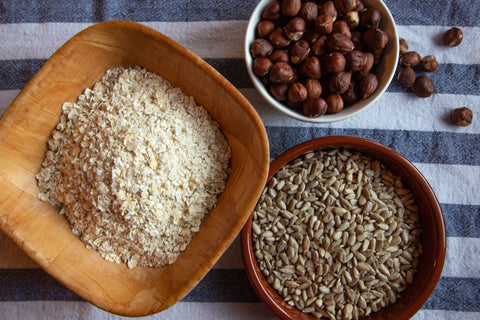What’s the deal with apple cider vinegar?
Posted on January 29 2020

Apple cider vinegar is hailed as a bit of a wellness wonder. But it can be tricky to know what’s worth your time when it comes to health hypes. Let’s take a look at apple cider vinegar, what it does, and whether it’s all it’s cracked up to be.
What is it?
First off, let’s clear up exactly what apple cider vinegar is. It’s a bit of a strange one (after all, we don’t usually drink vinegar). But there’s nothing strange about how it’s made. The juice from apples is fermented with yeast and sugar, to turn it into alcohol. Then a second fermentation takes place, and the sugar-turned-alcohol is converted into vinegar. Luckily, there’s no need to worry about getting tipsy, as the alcohol is turned to acetic acid during the process.
Here comes the weird bit. As the raw organic vinegar ferments, it produces what’s known as the ‘mother’ (you might have seen this advertised on bottles of apple cider vinegar). The ‘mother’ might not seem very appetizing, as it looks a bit like a cobweb, but it’s full of the good stuff. You should always look out for this when you purchase apple cider vinegar, as it means it hasn’t been pasteurized or filtered.

Why do people use it?
Apple cider vinegar has been linked to everything from good gut health, to better blood sugar, and healthier hair. This is because it contains vitamins, minerals, amino acids, organic acids, and polyphenolic compounds (disease-preventing micronutrients). It’s actually the fermentation process that gives us all this good stuff. But what do these nutrients do for your health?
- Support your digestive system
Like other fermented foods, apple cider vinegar (the organic, unfiltered kind) contains gut-friendly bacteria, which can help keep your digestive system working properly. It can help to provide relief for those with stomach problems like indigestion or heartburn. This is because it’s thought to neutralise stomach acid. The acetic acid in the vinegar is what’s believed to fight off harmful bacteria, which in turn, supports your microbiome and overall digestive balance.
- Balance your blood sugar
The idea is that the acetic acid in apple cider vinegar can stop your blood sugar from spiking, so it’s often used by those who need to keep their glucose levels in check. There have been several studies that demonstrate how vinegar can help improve insulin sensitivity (that is, how much insulin someone needs to lower blood sugar levels after eating) when taken alongside a high-carb meal.1 This is in both insulin-resistant and insulin-receptive participants, so it shows promise for us all.2
- Sustain healthy skin
Thanks to its natural antibacterial and anti-inflammatory properties, apple cider vinegar is loved by many as a skincare essential. The idea is that it balances your skin’s pH and has a smoothing, exfoliating effect. The malic acid in apple cider vinegar, is thought to work in a similar way to alpha-hydroxy acid, which helps remove dead skin cells. An added bonus is the positive effect apple cider vinegar can have on your hair, as well as your skin. The acidity means it can work as a post-shampoo rinse to help restore pH balance, which is important for smooth, shiny hair. As with all uses of the stuff, just be sure to dilute it properly first!

Are you meant to drink it?
Although the taste leaves much to be desired, plenty of people do drink apple cider vinegar. It’s best to dilute it first, not just because of the tart taste, but also due to the acidity. If you take a ‘shot’ of the stuff, it can be harsh on your throat and even damage your teeth. So, it’s best to mix two teaspoons into a large glass of water before drinking. However, if you don’t fancy downing vinegar, there are plenty of other ways to work it into your day.
For example, you can keep it old-school and use the vinegar on your food. The trick is to combine it with strong flavours, such as lemon or ginger. It’s great worked into a salad dressing and over your favourite veg. Try simply whisking it with olive oil, lemon juice, mustard and honey before drizzling. Or, you can add it into your smoothies and juices, as it pairs perfectly with citrus or berry flavours. Try a combination of apple, ginger and spinach as an energising alternative to coffee in the morning.
If you’re using apple cider vinegar for skincare, you can also apply it sparingly onto your skin. You can use it neat to dab on a spot but for everything else, dilute it before use. A mixture of 1 part vinegar to 2 parts water works well for a toner after cleansing your skin. However, if you’ve got sensitive skin, this might not be the home remedy for you. It’s always best to be cautious when using new skincare.

What to remember
There are a good few ways you can use apple cider vinegar if you want to see if it works for you. Just make sure you opt for a vinegar with the ‘mother’ still intact, and be sure to shake it up so everything is dispersed properly. This way, you get all the beneficial bacteria in every sip. Looks like an apple a day is good for your health, after all.




